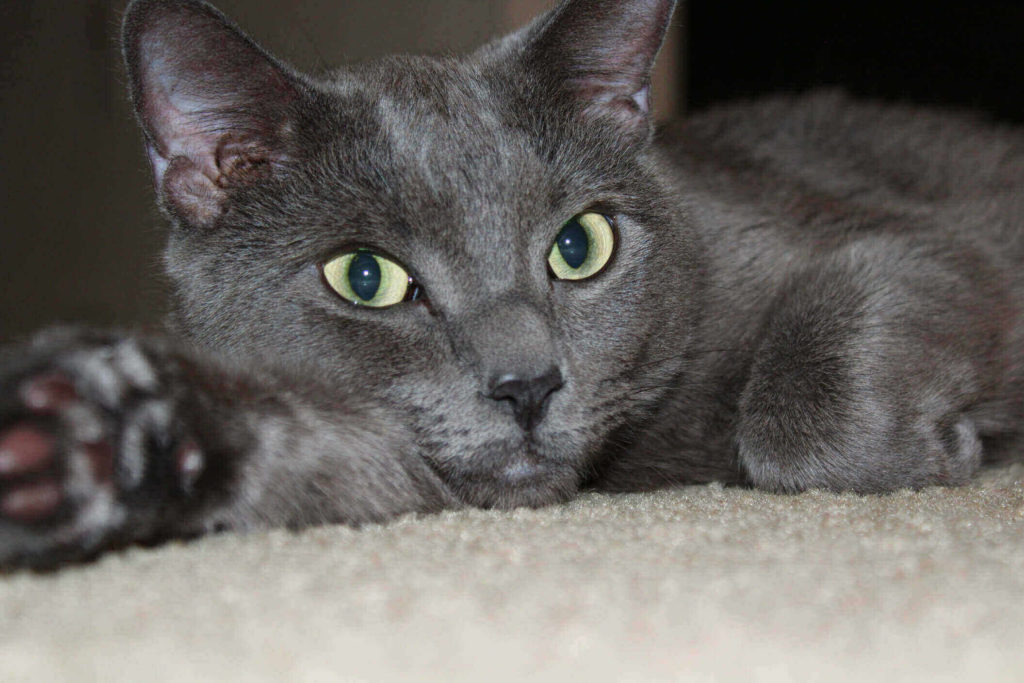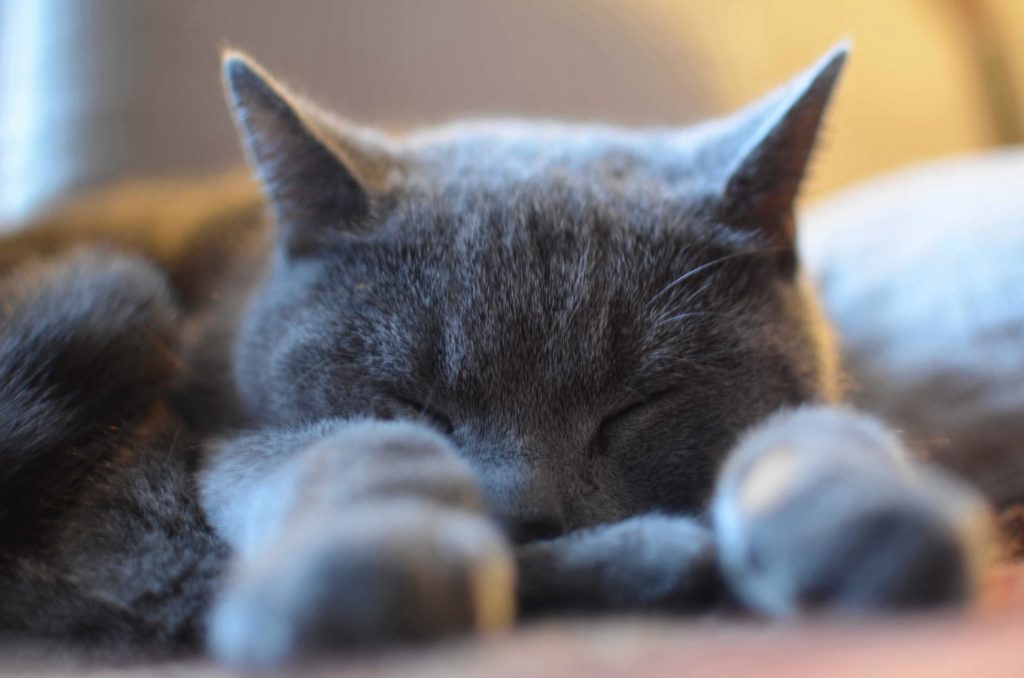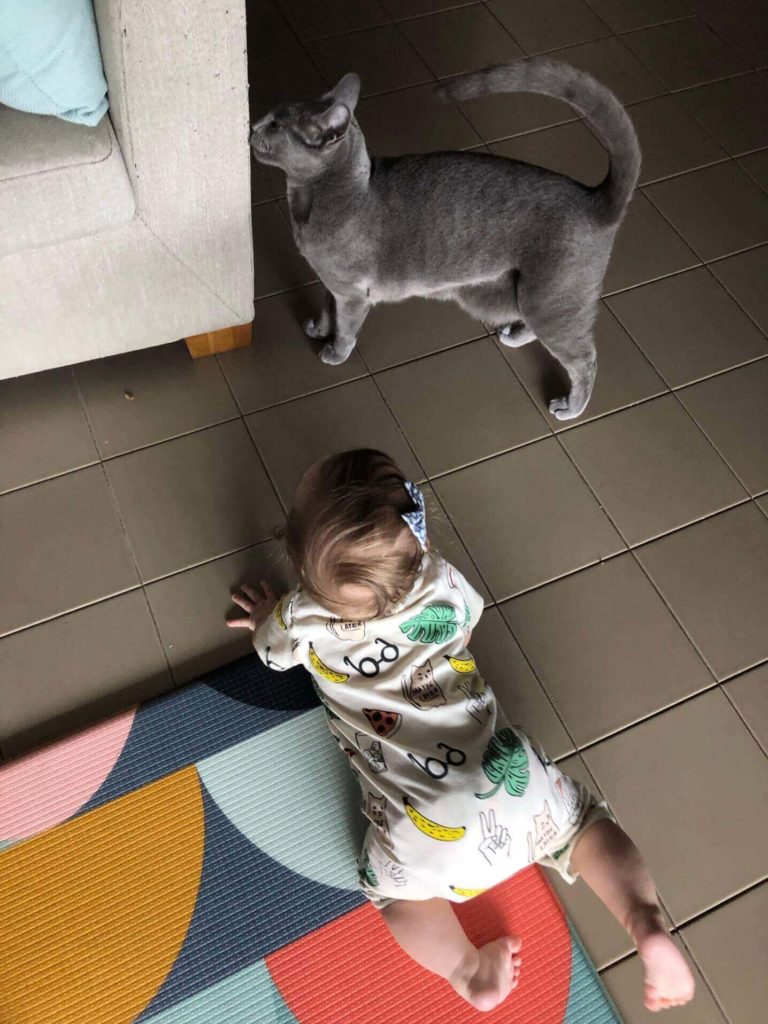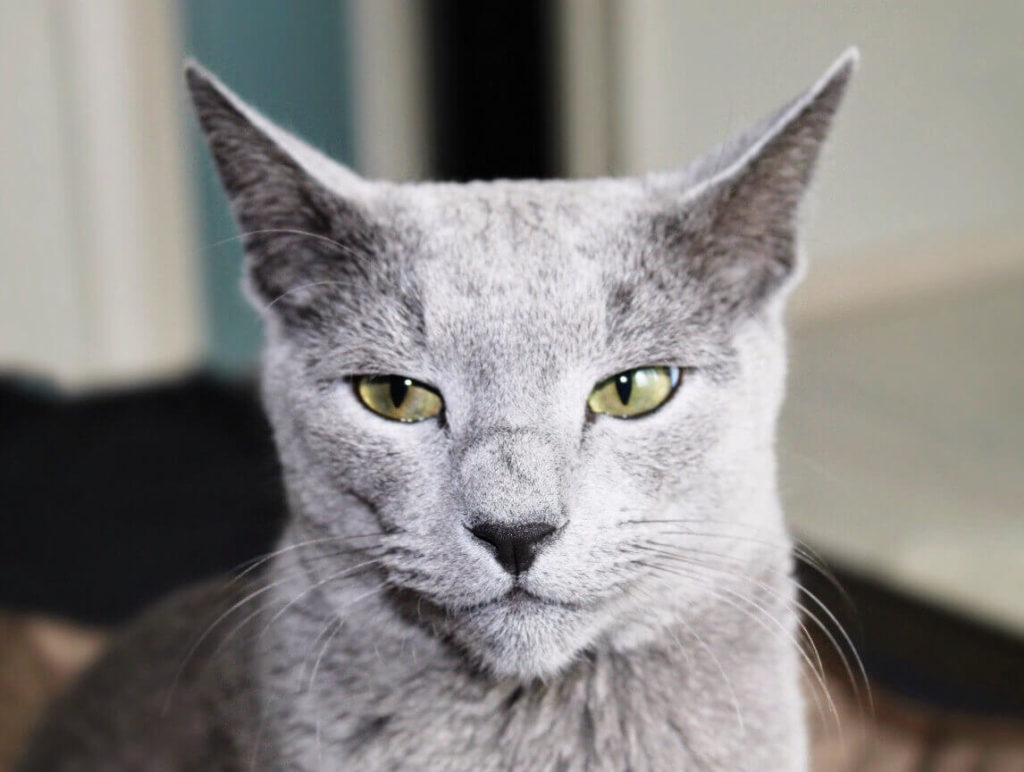Russian Blue Cats are born with gold in their eyes. These gold eyes slowly change to emerald stones that complement their beautiful personality. The eyes of Russian Blue cats are so beautiful that you wouldn’t want the Russian Blue cat to have eye problems.
But, life is rarely that wishful.
So, do Russian Blue cats have eye problems? The answer is yes.
Although eye problems are not genetic in Russian Blue cats, Russian Blues are not immune to eye problems. Russian Blue cats live for a long time and are prone to diseases of old age like cataracts and glaucoma. Moreover, trauma and stress might cause corneal ulceration, detached retinas, and headaches. Eye infections are also a possibility due to stress, parasites, virus, bacteria, etc.
Are Russian Blues with loss of eyesight happy? Can you prevent eye infections in your cat? To find out about your Russian Blue Cats eye health, probable eye diseases, and more, make sure t read the whole article.
Is Eye Problem In Russian Blue Common?
Russian Blue Cats don’t get genetic eye problems. But, these felines are not immune to eye problems. Read below to find out.
Pedigree Cats And Genetic Problems
Most pedigree cats are cross-bred and suffer from genetic problems. The pedigree cats have a scrunched face, which I bet looks really cute. Sadly, the scrunched small face causes the narrowing of tear ducts.
The narrow tear ducts cause a buildup of mucus and tears. This build-up makes pedigree cats (eg. Persians) prone to infection of the eyes. Well, this is really a sad reality of most pedigree cats.
There are also other diseases like nystagmus and myopia that affects the cross-bred pedigrees.
Now, you can take a time to breathe because Russian Blue Cats, although pedigree, don’t suffer from any genetic eye diseases.
Russian Blue Cats have a medium wedged shape head and a medium-sized face. Their eyes lie wide on their faces. Thus, Russian Blues are safe from genetic eye problems.
However, this doesn’t mean that Russian Blues don’t get an infection. It’s just that the eye problem is not genetic and neither common.
Eye Problem In Old Age
Talking about Russian Blues being a natural breed, this feline doesn’t have health issues and have a long life span. This longevity comes with a price though. The price is that old Russian Blues suffer from cataracts and glaucoma.
However, these diseases can be caused at any age (although rare in young kittens).
Trauma, Stress, And Anxiety
One thing you can notice if you have a Russian Blue cat is its sensitive nature. Any minor changes and Russian Blue tend to go nuts and anxious. This anxiety and stress are bad for your cat.
Russian Blue cats, in stress, tend to scratch themselves and their eyes. Scratching can lead to detachment of retinas, headache, corneal ulcers, etc. Therefore, play with your Russian blue cat by providing them their favorite toys that will keep them busy and also somehow lower their stress and anxiety. Here are the best Russian blue cat toys which you can pick.
Such eye problems can also happen with a blow to their head, fall from a height, etc. So, please take care of your lovely feline.
Environmental Pathogens
Viruses, bacteria, and other pathogens are responsible for giving your cat eye infections. One common infection is conjunctivitis.
How to Spot An Eye Infection Or Problem In Russian Blue Cat?
Russian Blue cats are polite. This lovely feline doesn’t want to bother you with their problems and pent up their feelings. You might not know what your cat is going through as she rarely expresses anything.
But, you need to keep your own eyes peeled for the sake of your cat. If your Russian Blue has the following, then it is time to take your cat to a veterinary and take care of your cat’s eyes.
- Cloudy white eyes
- Change of eye color
- Watery eyes
- Change in pupil size
- Discharge from eyes, or tearing
- Squinting
- Keeping eyes closed
- Excessive blinking
- Reddened eyes
- Rubbing and scratching Eyes because the eyes become itchy
- Your cat becomes clumsy, bumping into furniture or falling from stairs
- Your cat presses head against a wall or hard surface
A healthy eye is clear and bright. Anything other than this is a problem.
Eye Problems That Russian Blue Might Suffer
By now, you must know that Russian Blue cats don’t have genetic eye problems. However, the following are some eye problems that your Russian Blue might get.
Glaucoma
Glaucoma is seen mostly in Old Russian Blue cats. In this condition, there is increased pressure inside the eyes. This pressure can cause damage to the optic nerve and retina.
Glaucoma in Russian Blues is caused by old age. Additionally, glaucoma is also caused by underlying problems such as abnormality in the eye, trauma, inflammatory disorders, tumor, lens dislocation, etc.
Symptoms
- Your cats’ eye looks cloudy and white
- Tearing Eyes
- Redness Of eyes
- Dilated pupils
- In severe cases, the eyeball may bulge out due to excess pressure
- Pain might cause your Russian Blue to rub their eyes
- Sometimes, you can find Russian Blue pressing their head on the wall or hard surface. This is because of headaches from intense pressure in the eyes.
Treatment
Sadly, Glaucoma is irreversible. The most you can do is spot the problem early in your lovely cat and delay blindness. A good diet with supplements helps to delay blindness.
Moreover, you can treat the underlying problem in your Russian Blue. After that, I’m sure glaucoma will also stop progressing.
In severe cases, late cases, there should be ongoing management to prevent excess fluid build-up. Medication should be given on time. Surgery might also help in reducing the pressure of their eyes. This might slow down the process of Glaucoma.
In most extreme cases, there is no option but to do surgery and remove your cats’ eyes. And if only one eye of your Russian Blue has glaucoma and the other eye is healthy, then you have to carefully monitor the healthy eye.
Cataract
A cataract is also an eye problem in Old Russian Blue cats. A cataract is rare in kittens, although not uncommon.
In this condition, there is a thickening of the cornea which may lead to permanent blindness.
One cause might be nutritional deficiencies. However, Russian Blues are pedigree cats and fairly expensive. I doubt if they aren’t given nutritious food.
Another cause is Diabetes.
Symptoms
- Milky Cloudiness of the lens of eyes
- However, cataracts may be a slow process so your cat might be clumsy at first. Bumping into furniture, falling from stairs, etc. Russian Blues are extremely gracious and avid climbers. Thus, acting clumsy is very suspicious.
- If diabetes is the reason for cataract, then thirst, frequent urination, weight loss might occur
Treatment
In any condition, if Russian Blue does get cataracts, you have to get your Russian Blue a surgery. See, cataracts are irreversible. Thus, you have to get surgery to replace the lens and restore vision in your cat.
If the cataract is caused by Diabetes, controlling diabetes can control the cataract.
Moreover, the condition can be stopped for some time by providing supplements in your cats’ food. You can take the diet suggestion from your veterinary.
Detached Retinas
Detached Retinas means the retina of the cat’s eye comes off. Detached Retina problems, in extreme cases, cause loss of vision.
The cause of the detached retina is trauma to the head or eyes. It is even due to problems like glaucoma and cataract.
Furthermore, underlying conditions like hyperthyroidism, diabetes, hypertension, and kidney disease is responsible for a detached retina. You should get your Russian Blue checked for any underlying problems too.
Symptoms
- Your cat might behave clumsily. Bumping into furniture, falling from stairs, etc.
Treatment
In most cases, the retinal damage is permanent and causes loss of vision.
However, in a few cases, surgery can help in recovering vision.
Conjunctivitis (Pink Eye)
Conjunctivitis is when the eye becomes red due to inflammation of the mucous membrane.
The cause is a bacterial or viral infection. It is caused by the Herpes virus, chlamydia, mycoplasma, and even allergens too.
And generally, conjunctivitis is spread through the droplets from the respiratory tract.
However, this conjunctivitis isn’t the same as humans. Feline conjunctivitis is communicable only to cats. Thus, your Russian Blue contracts this from other cats and not a human being.
Symptoms
- Teary and runny eyes
- Gray, yellow, green, or even a red sticky pus-like discharge from the eyes.
- Swelling of eyes
- Squinting and closing of eyes
Treatment
Your doctor will prescribe your cat anti-inflammatory drugs and eye ointments.
If the cause is by bacteria, you should treat your cat with antibiotics.
Viral conjunctivitis requires anti-viral treatment or tropical treatment.
Sometimes, allergens can cause conjunctivitis. If you can find out what is causing an allergenic reaction in your Russian Blue, you can keep them away from the allergens. Furthermore, you can use antihistamines too.
However, you should take the suggestion of your veterinary doctor.
How Can You Prevent Eye Problems In Your Russian Blue?
Since prevention is better than cure, you need to take some precautions to prevent eye problems in your Russian Blue.
See, problems like cataract and glaucoma can be inevitable due to old age. Your old lady/gentlemen should live with it for the rest of their life.
However, diseases like conjunctivitis and diseases caused by trauma can be prevented by you. Provide your Russian Blue good care like the care you take of yourself. Don’t leave any stone unturned for your cat.
Take Care Of Your Cats’ Beautiful Eyes
Wash the eyes with cotton wool filled with water. Use separate cotton wool for each eye. Dampen the eyelids with the cotton very softly.
Don’t literally wash the eyeballs though. Just Clean the eyelids and areas around the eyes.
Keep Your Cat Indoors
Since Russian Blue cats are indoor cats, make your home environment clean and hazard-free.
Don’t let your cat go outdoors without your assistance. By not Going outside, your cat is protected from getting communicable feline diseases. However, you can let your Russian blue outside by implementing preventive measures.
Moreover, giving your cat a peaceful environment is very important so they don’t develop anxiety and stress. You should make sure that your cat doesn’t go nuts and scratch herself.
Good Diet
Your cat is what she eats. Thus, Give your Russian Blue a balanced diet. A good diet can delay the eye problems like cataract and glaucoma.
Visiting A Veterinary
Routine visits to the veterinary are also equally as important. If you can, schedule at least 3-4 visits to the veterinarian every year.
Moreover, Vaccinate your Russian Blue.
Check Out For Any Unusual Signs
You have to keep your own eyes peeled for any unusual eye boogers and anything weird around your cats’ eyes. This includes taring, redness, swelling, mucus, etc.
Your cat should have clear and bright eyes.
Frequently Asked Questions (FAQs)
Are Cats Who Have Lost Vision Happy?
Cats are animals with sharp senses of smell, sound, eyesight, taste, etc. Your Russian Blue is no different. Their ability to hear and the smell is so refined that they can fairly live without vision (if it gets lost in any case).
It is fairly common in old age that humans tend to get bad eyesight. The same case is for Russian Blues who are getting old. Diseases like cataract, glaucoma can inevitably cause blindness.
You don’t have to worry. Many cat owners are surprised at their old cats who have turned blind, accommodate it easily through their refined sense of smell and hearing.
Furthermore, blind cats can locate the fish poles, toys easily with this superb sense. You’ll be surprised to see your Russian Blue play as happily as it was before losing vision.
To sum up, yes, cats who lose vision are happy.
Do Russian Blue Cats Lose Vision Due To Eye Problems?
Yes, Russian Blue cats may lose vision due to eye problems. However, these problems aren’t genetic.
Old Russian Blue cats lose vision to cataracts and glaucoma. While other reasons like retinal detachment can cause any aged Russian Blue to lose vision. This is caused by trauma or scratching.
If you intervene in treating your Russian Blue early, then, blindness can be prevented. However, leaving a problem untreated can cause blindness quite easily.
How Long Do Eye Infections Last In Your Russian Blue Cat?
Bacterial and viral infections last for a maximum of 14 days. However, you need to get your Russian Blue checked if the infection lasts for more than 14 days.
Cataract and glaucoma may affect your cat for her entire life. These are irreversible diseases. Also, retinal displacement.
Most importantly, if you diagnose early and your cat responds well to the treatment, then everything will be well.
Do Eye Problems In Russian Blues Go On Their Own?
Especially viral infections in Russian Blues go on their own without knowing like conjunctivitis.
However, you need to intervene for quicker healing. And make sure that no further complication occurs in your Russian Blue.
A bacterial infection needs appropriate antibiotic treatment.
And diseases like cataract, detached retinas, glaucoma, don’t go away on their own. These diseases need your intervention and care to heal.
Furthermore, visits to the veterinary and surgery are required in some cases.
Should You Clean Your Russian Blue Cats’ Eye Boogers?
A clean eye is always healthy. If you see any boogers like mucous, tears, or other matter, then get to work.
Wipe your cats’ eyes cleanly with water-dipped cotton wool. Clean each eye with separate cotton wool. Do it softly and gently.
Conclusion
I hope you got the answers to your questions about the eye problem in Russian Blue cats.
To sum up, Russian Blues don’t get genetic eye problems. Rather, these felines get eye problems due to old age, stress, trauma, and the pathogens residing in the air around them.
And yes, you can be fairly sure that Russian Blue cats who tend to lose vision also remain happy with the rest of sharp senses.
Moreover, you need to spot the early signs of eye problems and take swift action in case of any unusual symptoms. Most importantly, prevention is better than cure.




